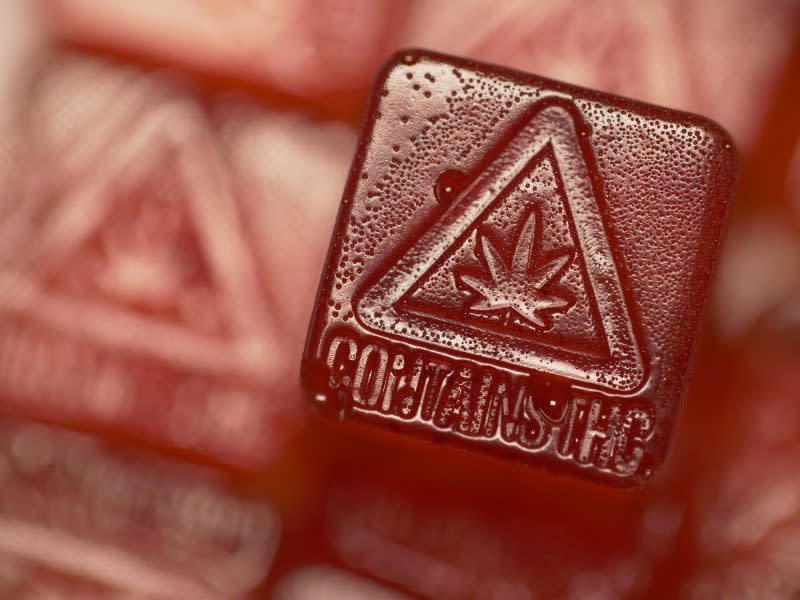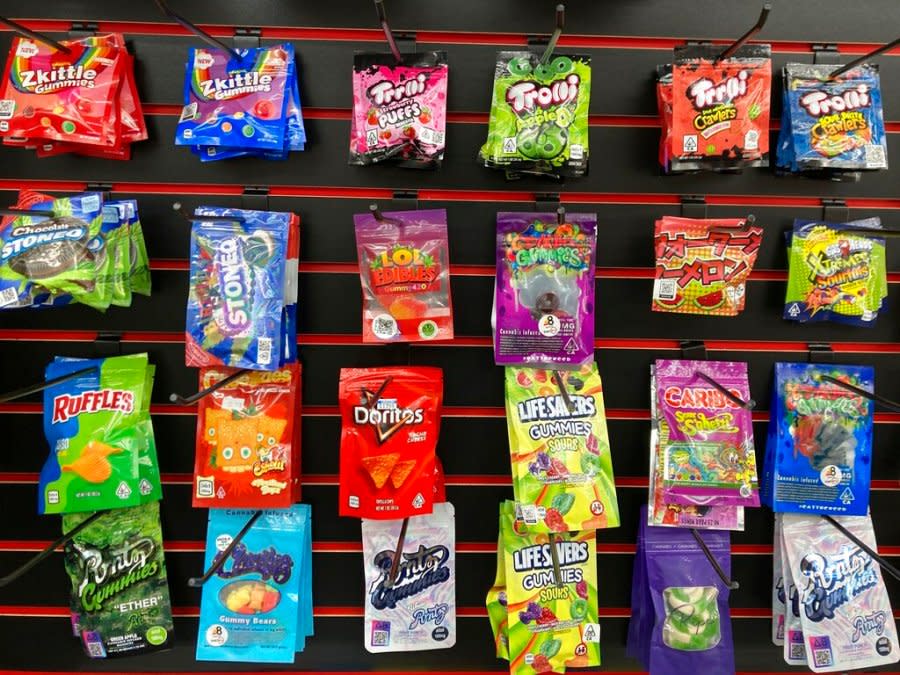‘Diet weed’: What it is, and why experts say it can be dangerous

(NEXSTAR) – Should we be wary of “diet weed”?
Delta-8 tetrahydrocannabinol (Delta-8-THC) is one of many cannabinoids found in the cannabis sativa plant, though it isn’t naturally produced at the same rate or potency as Delta-9-THC, the compound largely responsible for marijuana’s psychoactive effects.
“Chemically, they’re almost identical. But that one little difference in that chemical structure results in a different way that it interacts with your body … with your [cannabinoid] receptors,” explains Ryan Vandrey, Ph.D., a professor at the Johns Hopkins School of Medicine who specializes in the behavior pharmacology of cannabis.
“The reason people call Delta-8-THC ‘diet weed’ [is because] that chemical difference is a little less potent at what it does at the receptor,” Vandrey said, telling Nexstar that Delta-8 is “about half as effective” at producing the same effects as Delta-9.
Marijuana use increases risk of heart attacks, new studies suggest
Still, Delta-8-THC has experienced a boom in popularity in recent years, largely thanks to the 2018 farm bill which, when enacted, inadvertently paved the way for the Ninth Circuit Court to rule that certain low-THC cannabis derivatives were exempt from the Controlled Substances Act.
The Food and Drug Administration, in recent years, has publicly taken issue with the unregulated status of Delta-8 and similar cannabinoid derivatives, noting that Delta-8 still has “psychoactive and intoxicating effects that may be dangerous to consumers” and urging Congress to establish regulations. These hemp-derived cannabinoids are also often chemically synthesized, allowing for the potential of harmful contaminants, the FDA argues.
Making matters murkier, the U.S. Drug Enforcement Administration (DEA) continues to maintain that non-naturally occurring cannabinoids (i.e., chemically derived versions) are controlled substances, despite the Ninth Circuit Court’s 2022 ruling.
Some lawmakers are currently working to close the loophole that allowed Delta-8 to become legal on a federal level. But in the meantime, many states have set their own regulations concerning the legality of hemp-derived products — a move which may only further confuse things, according to experts.
“In addition to lack of regulation, we have regulatory incoherence from different branches and levels of government. … That’s going to make it even harder to get any coherent regulation on things,” Peter Grinspoon, M.D., a primary care doctor and cannabis specialist at Mass General Hospital and an instructor at Harvard Medical School, tells Nexstar.
Grinspoon, also the author of “Seeing Through the Smoke: A Cannabis Specialist Untangles the Truth About Marijuana,” is himself a proponent of legalized recreational marijuana. But even he feels there needs to be and oversight to make sure it’s being regulated to restrict who has access to it, and to prevent contaminants, which can include heavy metals, pesticides or other harmful substances.
“Delta-8 is so close to Delta-9, it’s probably relatively safe,” Grinspoon says. “But even if we figured out that Delta-8 is safe — the Delta-8 you’re buying at your local smoke shop, we have no idea what’s in it.”
Vandrey also opened the possibility that some readily available Delta-8 THC products may be substituting other cannabinoids aside from Delta-8, or other drugs entirely.
“The main harm in all of this is that the industry has been allowed to exist and flourish with no regulatory control. The result is poor product control, poor dosage label accuracy, and contaminated products are widely available,” Vandrey says.
“There are individual companies and entities that are probably doing a good job [of their own quality control], but most certainly there are companies or entities that are not,” he added.
“It’s very concerning.”
The FDA, over the last year, has similarly warned of the possibility that “unsafe” chemicals may be used to chemically synthesize or dye Delta-8 products. But Delta-8 itself may cause serious adverse effects on its own, the agency says.
Between Dec. 2020 and March 2022, the FDA said it was made aware of 104 cases of adverse effects including “hallucinations, vomiting, tremor, anxiety, dizziness, confusion, and loss of consciousness,” over half of which required medical evaluation. During a similar time frame, national poison control centers reported thousands of cases of exposure, including one pediatric case that was “coded with a medical outcome of death,” the FDA wrote.
In 2023, the FDA and the Federal Trade Commission (FTC) also warned a half-dozen companies to stop selling Delta-8-THC products in packaging that resembled snack foods.
“Children are more vulnerable than adults to the effects of THC, with many who have been sickened and even hospitalized after eating ‘edibles’ containing it,” wrote FDA Principal Deputy Commissioner Janet Woodcock, M.D.
Woodcock also said adults, too, were at risk of “serious” consequences when taking THC products in high doses.
Vandrey, who has observed Delta-8’s effects in human laboratory experiments at Johns Hopkins, said that people diagnosed with psychosis, schizophrenia, bipolar disorder and cardiovascular disease, among other conditions, are at higher risk of “very severe reactions” from taking Delta-8 THC products. And having a nickname like “diet weed” (or “cannabis lite,” as Grinspoon has heard) doesn’t do much to warn users of its potentially adverse effects, Vandrey adds.
“When you have connotations that it’s ‘diet weed,’ and you can buy it at the gas station, you think, ‘How can it be harmful?’” he says. “A lot of folks don’t understand you can get a very strong psychoactive effect, and become very impaired and very intoxicated using these products.”
You can’t trash or recycle them. So how do you safely get rid of disposable e-cigarettes?
To prevent any further harm to users, Vandrey believes the government — including the FDA and DEA — should work toward clearing up any gray areas of legality concerning Delta-8-THC. And if it is legal, to start regulating it like everything else.
The other solution, as hinted at by both Vandrey and Grinspoon, is the federal legalization of Delta-9 THC — which is already legalized and regulated in many states — as they believe it would tank the market for unregulated Delta-8 THC products.
“What the science tells us is … it’s really just a potency difference [between Delta-8 and Delta-9 THCs],” Vandrey says. “Knowing that, it makes no sense to have one be a Schedule 1 drug and one be unscheduled and unregulated.”
“This is like the wild west,” Grinspoon adds. “It needs regulation.”
For the latest news, weather, sports, and streaming video, head to WesternSlopeNow.com.


